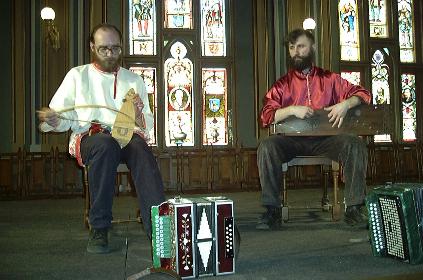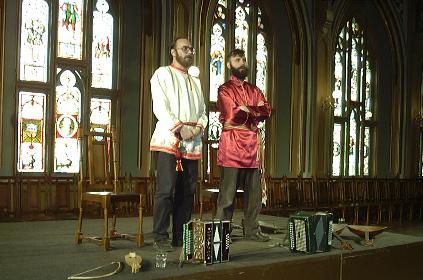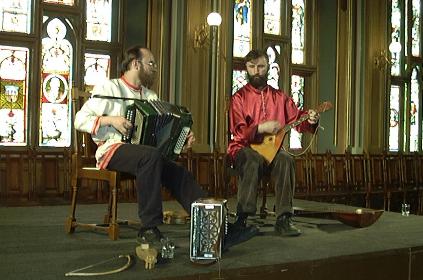|
|
|
|
|
Folklore groups
Instruments Activities About us |
|
|
|
Calendar
Regular Reportings Education |
|
|
|
Support
Fonts Mpeg3 Links Addresses Statistics Guestbook |
|
|
|
You are visitor of folklora.lt and visitor of this page. |
|
Concert of the group "Lad", Riga,
During Easter of christians (by Gregorian calendar)
within the folklore festival Rīga music
in Riga performed two men - the Russian folklore ensemble Lad
from St. Petersburg.
The program was chronological - they begun by more ancient instruments,
step by step passing to newer, with some a capella songs between them.
Then two balalaikas (a smaller one and a bigger one) and squeeze-boxes of
two types (hromka and Vologda's) was presented. The musicians played them
in different combinations, showing playing manners of different places and
times. At the end musicians have fled in to a rage and begun to beat a
timbrel and even to dance.
To characterise the performance in general, accidentally would be desirable
to compare it with
the previous visitors of the
festival - a Lithuanian ensemble Sutaras. If the Lithuanians
were staged until smallest details (well-groomed costumes, free speeches,
involving of spectators), for the sake of which were necessary slightly
to offer up an authenticity of performance and a human simplicity, with
the Russians all was on the contrary: they were sincere, but in the same
time the speech sometimes "catched"; they showed different authentic manners
of playing (instead of folklore arrangements with a smack of a conservatory,
as the Lithuanians), however, they had modern and dirty boots. It is
difficult to tell, what is better. Those are different, non-crossing ways; both
are good, both are necessary. But anyway, if Sutaras tries to
make a business on the basis of folklore materials, the participants
of Lad unselfishly devote life to a preservation of authentic
folklore traditions. And if the firsts arouse a high pleasure, the seconds
arouse a high esteem. Songs' recordings from this activity (recorded 17.IV, LU):
Article: Ansis Ataols Bērziņš, 4 May 2003 |
|
Questions, comments and suggestions are welcome to ansis_N@N_folklora.lt This page is created with support of SFL, Latnet and Lanet. |
|
03 September 2018 |


